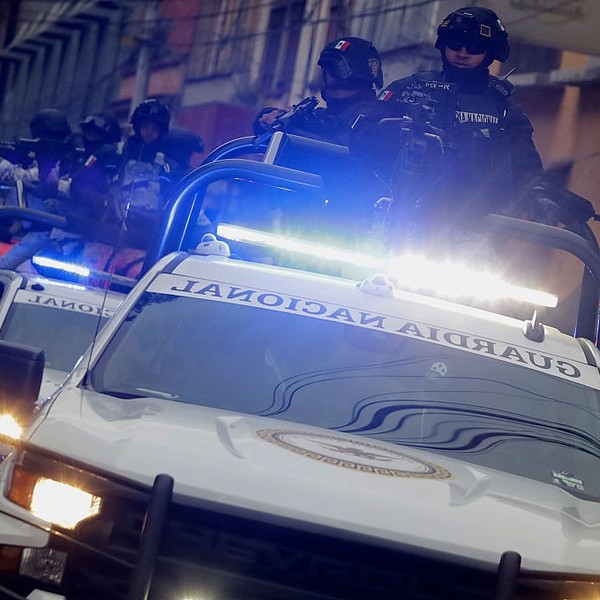A series of events last week led to escalating tensions between the U.S. and Iran. While tensions had seemed to ease somewhat on Friday, President Trump tweeted on Sunday ‘If Iran wants to fight, that will be the official end of Iran. Never threaten the United States again!’
Intelligence sources told The New York Times last week that members of the Iranian Revolutionary Guard Corp (IRGC) had been loading missiles on to ships in what intelligence officials saw as an escalatory move toward a potential attack.
Officials told the NYTimes later in the week that they also watched as some of those missiles were removed, thereby easing tensions somewhat between the two countries.
Prior to that reporting, there were reports that a drone attack had been launched against a Saudi oil pipeline and before that, that two Saudi tankers had been sabotaged while off the coast of Dubai, prompting a number of consequences, including Lloyd’s of London widening its list of areas that pose “enhanced risk for marine insurers”.
We asked Cipher Brief expert and former senior analyst at CIA, Steven R. Ward, whether the missile movements were more likely business as usual, or a sign that the IRGC was increasing its activities in light of new pressure being applied by the U.S.?
Ward: Based on Tehran’s responses to U.S. pressure and military threats after 2001, I suspect Iranian military units such as these are preparing for contingency operations for possible hostilities. Iran generally is wary of providing the United States a pretext for an attack. It will likely avoid making a direct strike on U.S. forces or interests and instead will rely on indirect and plausibly deniable operations against U.S. allies and their interests. From Tehran’s perspective, it is only prudent to prepare for responses to potential U.S. attacks to try to dissuade or deter additional assaults and limit escalation.
I use the phrase “after 2001” because Iran has reacted strongly to feared U.S. military action amid rising tensions in the past, most infamously by facilitating the 1996 Khobar Towers terrorist bombing in Saudi Arabia that killed 19 U.S. servicemembers. Washington should not rule out the prospect that, if Tehran perceives, correctly or not, that a U.S. attack is imminent, it might launch a preemptive strike to disrupt U.S. deployments and initial operations.
The Cipher Brief: How much regional impact do you place on news last week of armed drone attacks on one of Saudi Arabia’s oil pipelines?
Ward: First, while Houthi rebels claimed responsibility for the attacks and the head of their Supreme Revolutionary Committee and Tehran denied that Iran directed the strike and provided the drones, I suspect that an Iranian hand was there. The timing did not seem right for the Houthis, who were completing a withdrawal from the strategic port of Hodeidah to sustain a UN-brokered cease-fire.
The attacks were a pointed reminder that Tehran has options to make life difficult for all of its regional enemies and that ongoing economic warfare may push Iran into a corner where it starts looking to meet coercive pressure with some of its own.
If Iran were not behind this attack, we can only hope that it woke the leadership up to the fact that Tehran has placed at least some of its fate into the hands of the numerous armed non-state groups, each with its own interests and objectives, that receive Iranian support.
The Cipher Brief: The drone attack followed news that two Saudi oil vessels were sabotaged, causing considerable damage, as they sailed off the coast of Dubai. When we pull these threads together, what do you see?
Ward: The Saudi tankers were among four vessels, including one from Norway and another from the United Arab Emirates, that, according to Israeli press, probably were damaged by a low-tech limpet mine. Iran has the capability with trained divers, submersible swimmer delivery vehicle, and multiple types of mines to conduct this type of attack.
I think Iran probably now has the intent, so the connection is obvious. The Iranians are starting to push back because their country is hurting economically. The leadership also may have decided that trying to wait out the current U.S. administration is unsustainable. From Tehran’s perspective, the cautious policy of strategic patience and continued adherence to the nuclear agreement has been met with more sanctions and feckless responses by the non-U.S. signatories to the six-party Iran denuclearization deal.
The Cipher Brief: What should we be looking for in terms of next moves that might prove early indicators of a further escalation between the two countries?
Ward: I would look for Iran to continue to exploit vulnerabilities in the region to put pressure on Riyadh and Abu Dhabi. Cyberattacks, additional sabotage directed against oil facilities and tankers, interference with fishing and other vessels in the Persian Gulf, and perhaps the encouragement of additional Houthi attacks—especially in the wake of the seemingly indiscriminate Saudi-UAE air raids on Houthi positions in Sanaa this week. Covert Iranian operatives and intelligence officers could get creative with non-lethal operations—for example, using phony bomb or chemical-biological threats—outside of the region to affect Saudi, UAE, and U.S. business interests.
Tehran probably will track U.S. military deployments into the region as its measure of potential escalation. In particular, it will keep a close eye on any buildup outside the Strait of Hormuz—and outside the range of most of its missiles—with Oman, which signed a port access agreement with the United States in March, a focus of its attention. U.S. success in repairing relations with (or possibly strong arming) allies to support its military preparations will be another indicator for the Iranians that the threat of war is rising.
The Cipher Brief: Given the escalating tensions between Iran and the U.S., how likely is it that a series of unintended consequences may develop that would escalate this beyond what either country is saying they want right now, namely war?
I am many years away from my last probabilities and statistics class, so I am hesitant to guess about the overall likelihood of a series of unintended consequences resulting in war. The main point is that the answer is not zero. Moreover, each move to exert pressure to dissuade and deter (whether by Iran or the United States) creates countervailing pressures to show steadfastness or maintain allies’ confidence that can lead to the next potential escalatory move. Wars don’t happen by accident even if the trigger is unanticipated. The conditions for continued escalation are in play and will not go away absent decisions by all sides to deescalate, which would have to involve some relief for Tehran.
The Cipher Brief: What haven’t we asked you that is significance in understanding the broader picture and potential impact of the current tensions?
Ward: In trying to anticipate some of the dangers of the situation, no one should be confident that either Tehran or Washington has full control over events.
As I mentioned earlier, Tehran should be worrying that one or more Houthis or an Iraqi Shia militiaman could commit actions that, even though unintended, are so harmful that the United States and its allies, blaming Iran, feel compelled to respond militarily.
Similarly, potential uncoordinated Saudi or UAE retaliation for Iranian actions could create situations where nearby U.S. military forces are needed to salvage these allies’ operations.
Tehran also is vulnerable to potential false flag operations—covert actions taken by another country or non-state actor to implicate Iran in a provocation against U.S. or allied forces or interests. The Iranians have already made the claim that Israel did this with the attacks on the tankers. In a crisis, events might not allow sufficient time for confirming culpability.
The flip side is that the United States is vulnerable to these same potential false flag operations. It is well within the realm of possibility that countries wishing the United States ill or Iranian adversaries determined to harm Iran using U.S. firepower might stage an incident to provoke an escalation of tensions and increase the likelihood of hostilities.
Read more from Steven Ward in The Cipher Brief















